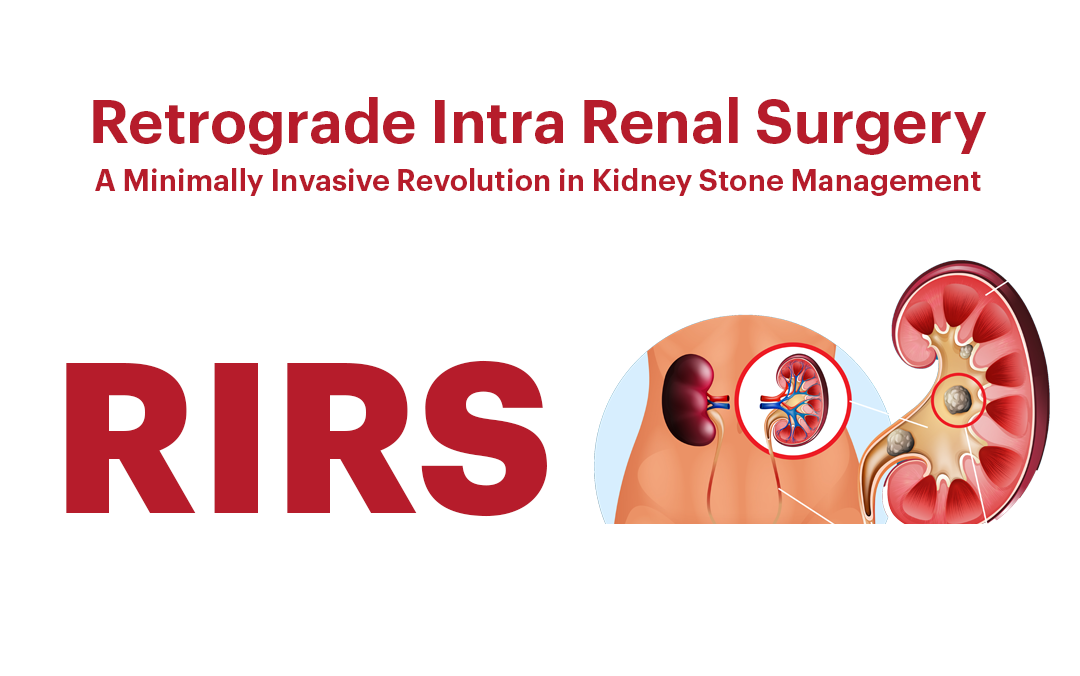

RIRS (RETROGRADE INTRA RENAL SURGERY): A MINIMALLY INVASIVE REVOLUTION IN KIDNEY STONE MANAGEMENT

Imagine you're dealing with the sharp, intense pain of a kidney stone, a condition that affects millions of people worldwide. Fortunately, the field of urology has seen significant advancements in the treatment of kidney stones, and one of the most innovative approaches is Retrograde Intra Renal Surgery (RIRS). This procedure offers a minimally invasive solution, sparing patients from the more traditional and invasive options. In this educational content, we will delve into the world of RIRS, exploring its indications, the procedure itself, recovery, potential complications, and its pivotal role in modern urology.
Understanding Kidney Stones and the Need for RIRS
1. Kidney Stones: Kidney stones are solid deposits that form in the kidneys when minerals and salts in the urine crystallize. These stones can vary in size and composition and often lead to severe pain and discomfort when they move through the urinary tract.
2. Indications for RIRS: RIRS is typically recommended for patients with smaller kidney stones, particularly those located in the renal pelvis and upper ureter. It is also an option for individuals who cannot undergo other stone removal procedures due to anatomical reasons or contraindications.
The RIRS Procedure
1. Anesthesia: RIRS is performed under general anesthesia to ensure the patient's comfort and minimize any discomfort during the procedure.
2. Access: The surgeon gains access to the kidney via a thin, flexible scope called a flexi ureteroscope, which is inserted through the urinary tract.
3. Stone Identification: With the ureteroscope in place, the surgeon identifies the kidney stone and assesses its size and location using a camera at the tip of the scope.
4. Laser Fragmentation: A laser fibre is introduced through the flexi ureteroscope, and high-energy laser pulses are used to fragment the kidney stone into smaller, more manageable pieces.
5. Stone Retrieval: The broken stone fragments are then either retrieved using a specialized basket or allowed to pass naturally through the urinary tract. Sometimes, a stent is placed temporarily to ensure proper urine drainage while the fragments are passed.
Recovery and Aftercare
1. Hospital Stay: RIRS is usually an outpatient procedure, and patients can return home the same day. In some cases, an overnight hospital stay may be recommended.
2. Recovery Time: Recovery following RIRS is relatively quick, with most patients returning to normal activities within a few days to a couple of weeks. Post-operative discomfort, mild blood in the urine, and urgency to urinate are common but temporary side effects.
3. Follow-up: Follow-up appointments with the urologist are scheduled to monitor recovery, assess stone clearance, and remove any temporary stents placed during the procedure.
Potential Complications
1. Bleeding: While RIRS is considered a safe procedure, minor bleeding can occur, especially when breaking down larger stones. In most cases, this bleeding stops naturally, but occasionally, further intervention may be required.
2. Infection: Infections are a rare but potential risk associated with any surgical procedure. Antibiotics are often prescribed before and after RIRS to minimize this risk.
3. Residual Stones: In some cases, not all stone fragments may be successfully removed during the initial RIRS procedure. Additional treatments or procedures may be necessary to clear any remaining stones.
The Significance of RIRS in Modern Urology
Retrograde Intra Renal Surgery (RIRS) represents a significant advancement in the field of urology and kidney stone management. This minimally invasive procedure offers several key advantages:
1. Precise Targeting: RIRS provides urologists with the ability to precisely target and treat kidney stones, even in challenging locations within the kidney.
2. Minimal Scarring: As RIRS is performed through the natural urinary tract, there are no external incisions, resulting in minimal scarring and a faster recovery.
3. Less Pain and Discomfort: Compared to traditional surgical approaches, RIRS is associated with less post-operative pain and a quicker return to regular activities.
4. Safe and Effective: RIRS has a high success rate in clearing kidney stones and is generally safe for a wide range of patients, including those who may not be candidates for more invasive procedures.
Conclusion:
Retrograde Intra Renal Surgery (RIRS) is a groundbreaking and minimally invasive approach to the treatment of kidney stones. It offers a safe and effective solution for patients suffering from this painful condition while minimizing discomfort and recovery time.
Patients considering RIRS should consult with their urologist to determine if it's the right choice for their unique circumstances, taking into account factors like stone size, location, and overall health. RIRS has undoubtedly revolutionized the management of kidney stones and stands as a testament to the ongoing advancements in modern urology.














